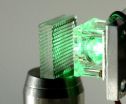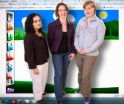(Press-News.org) Put down those science text books and work at recalling information from memory. That's the shorthand take away message of new research from Purdue University that says practicing memory retrieval boosts science learning far better than elaborate study methods.
"Our view is that learning is not about studying or getting knowledge 'in memory,'" said Purdue psychology professor Jeffrey Karpicke, the lead investigator for the study that appears today in the journal Science. "Learning is about retrieving. So it is important to make retrieval practice an integral part of the learning process."
Educators traditionally rely on learning activities that encourage elaborate study routines and techniques focused on improving the encoding of information into memory. But, when students practice retrieval, they set aside the material they are trying to learn and instead practice calling it to mind.
The study, "Retrieval Practice Produces More Learning Than Elaborative Studying With Concept Mapping," tested both learning strategies alongside each other. The research was funded by the National Science Foundation's Division of Undergraduate Education.
"In prior research, we established that practicing retrieval is a powerful way to improve learning," said Karpicke. "Here we put retrieval practice to the test by comparing its effectiveness to an elaborative study method, specifically elaborative studying by creating concept maps."
Concept mapping requires students to construct a diagram--typically using nodes or bubbles--that shows relationships among ideas, characteristics or materials. These concepts are then written down as a way of encoding them in a person's memory.
The researchers say the practice is used extensively for learning about concepts in sciences such as biology, chemistry or physics.
In two studies, reported by Karpicke and his colleague, Purdue University psychology student Janell Blunt, a total of 200 students studied texts on topics from different science disciplines. One group engaged in elaborative study using concept maps while a second group practiced retrieval; they read the texts, then put them away and practiced freely recalling concepts from the text.
After an initial study period, both groups recalled about the same amount of information. But when the students returned to the lab a week later to assess their long-term learning, the group that studied by practicing retrieval showed a 50 percent improvement in long-term retention above the group that studied by creating concept maps.
This, despite the students own predictions about how much they would actually remember. "Students do not always know what methods will produce the best learning," said Karpicke in discussing whether students are good at judging the success of their study habits.
He found that when students have the material right in front of them, they think they know it better than they actually do. "It may be surprising to realize that there is such a disconnect between what students think will afford good learning and what is actually best. We, as educators, need to keep this in mind as we create learning tools and evaluate educational practices," he said.
The researchers showed retrieval practice was superior to elaborative studying in all comparisons.
"The final retention test was one of the most important features of our study, because we asked questions that tapped into meaningful learning," said Karpicke.
The students answered questions about the specific concepts they learned as well as inference questions asking them to draw connections between things that weren't explicitly stated in the material. On both measures of meaningful learning, practicing retrieval continued to produce better learning than elaborative studying.
Karpicke says there's nothing wrong with elaborative learning, but argues that a larger place needs to be found for retrieval practice. "Our challenge now is to find the most effective and feasible ways to use retrieval as a learning activity--but we know that it is indeed a powerful way to enhance conceptual learning about science."
### END
Science learning easier when students put down textbooks and actively recall information
Actively recalling information from memory beats elaborate study methods
2011-01-22
ELSE PRESS RELEASES FROM THIS DATE:
HEPA filters reduce cardiovascular health risks associated with air pollution
2011-01-22
Using inexpensive air filters may help reduce cardiovascular disease risk that results from exposure to air pollution, according to researchers from Canada, who studied healthy adultsliving in a small community in British Columbia where wood burning stoves are the main sources of pollution. The researchers found that high efficiency particle air (HEPA)filters reduced the amount of airborne particulate matter, resulting in improved blood vessel health and reductions in blood markers that are associated with an increased risk of cardiovascular disease.
The findings were ...
CT scanning aids rapid diagnosis, treatment planning for abdominal pain
2011-01-22
The use of CT scanning to evaluate abdominal pain in emergency departments can help physicians arrive at a diagnosis quickly and decisively. A study conducted at Massachusetts General Hospital (MGH) and appearing in the February issue of the American Journal of Roentgenology also finds that information provided by CT scans changed treatment plans for almost half the patients studied and significantly reduced probable hospital admissions.
"Our report addresses an important question with substantial policy relevance – what is the value of CT scanning in the emergency ...
Why do some diabetics escape complications?
2011-01-22
"The majority of diabetics will over time develop severe or fatal complications, but 10 per cent never do. They are the ones we are interested in in the PROLONG study", explains Valeriya Lyssenko, who along with Peter Nilsson, both from Lund University Diabetes Centre, leads the PROLONG study.
Stiff sugary arteries:
Despite decades of intensive research on diabetes complications, the fundamental mechanisms are not yet fully known. Neither is it possible to prevent or treat the damage to the blood vessels that affects the majority of diabetics.
The risk of ...
Monk seal and hump-backed dolphin are threatened by fishing activities off coast of Mauritania
2011-01-22
Catalan researchers have studied the marine trophic network in Mauritania, on the north west coast of Africa, which is an extremely heavily exploited fishing area, as well as being home to two of the world's most threatened species of marine mammal – the monk seal and the Atlantic hump-backed dolphin. The results of the study show that industrial and traditional fishing activities along the coast are putting these mammals and local marine ecosystems at great danger.
The researchers studied the local marine trophic network off the north west coast of Africa, and by analysing ...
Montrealers are feeding fish Prozac
2011-01-22
This press release is available in French.
Around one in four Montrealers take some kind of anti-depressant, and according to new research, the drugs are passing into the waterways and affecting fish. The findings are internationally significant as the city's sewage treatment system is similar to that in use in other major cities, and moreover, it is reputed to be the third largest treatment system in the world. Lead by Dr. Sébastien Sauvé at the University of Montreal's Department of Chemistry and André Lajeunesse, a PhD candidate, the research team found that the ...
New Anglo-Swiss research questions impact of GM wheat on insects
2011-01-22
An Anglo-Swiss research project has found that the impact of disease-resistant genetically-modified wheat plants on insects may be negligible.
Many studies have looked at the effects of genetically-modified (GM) plants on single non-target insects. However, agro-ecosystems are characterised by numerous insect species forming food webs. This study is the first to investigate different transgenic disease-resistant wheat lines and their effect on the structure of whole aphid-parasitoid food webs.
The findings are published this week in the Royal Society journal, Biology ...
Nanoworld in color
2011-01-22
This press release is available in German.
Lights off – projector on. Lecture theaters, conference halls and seminar rooms currently have to be darkened if the speaker wants to project a presentation on screen. Unfortunately, the attention of the listeners goes off with the lights, and tiredness takes over. A new technique promises to remedy this situation. The projectors of the futur will not only be small and easy to use but also shine so brightly that the images appear sharp and clear, even in a sun-filled room.
The image illuminating the wall of the Fraunhofer ...
Researchers reveal function of novel molecule that underlies human deafness
2011-01-22
New research from the University of Sheffield has revealed that the molecular mechanism underlying deafness is caused by a mutation of a specific microRNA called miR-96. The discovery could provide the basis for treating progressive hearing loss and deafness.
The research team, led by Dr Walter Marcotti, Royal Society University Research Fellow from the University's Department of Biomedical Science, in collaboration with Professor Karen Steel at the Sanger Institute in Cambridge, discovered that the mutation in miR-96 prevents development of the auditory sensory hair ...
New study of environmental contaminants in breast milk
2011-01-22
The levels of environmental contaminants in a mother's body decrease during breast-feeding. After a year of lactation, the levels of a number of environmental contaminants in breast milk drop by 15 – 94 per cent, according to a recent study from the Norwegian Institute of Public Health. There has been little study into this topic previously.
Breast milk is nutritionally the best food for infants and contains all the substances a child needs for optimal growth and development. However, breast milk contains low but measurable concentrations of environmental contaminants, ...
With cloud computing, the mathematics of evolution may get easier to learn
2011-01-22
BUFFALO, N.Y. -- An innovative, educational computing platform developed by University at Buffalo faculty members and hosted by the cloud (remote, high-capacity, scalable servers) is helping UB students understand parts of evolutionary biology on an entirely new level. Soon, high-school and middle-school students will benefit from the same tool as well.
Pop! World, developed by UB faculty members with a $250,000 National Science Foundation grant, takes advantage of cloud computing, which allows programs to run on remote servers instead of through departmental or institutional ...
LAST 30 PRESS RELEASES:
New research finds heart health benefits in combining mango and avocado daily
New research finds peanut butter consumption builds muscle power in older adults
Study identifies aging-associated mitochondrial circular RNAs
The brain’s primitive ‘fear center’ is actually a sophisticated mediator
Brain Healthy Campus Collaborative announces winner of first-ever Brain Health Prize
Tokyo Bay’s night lights reveal hidden boundaries between species
As worms and jellyfish wriggle, new AI tools track their neurons
ATG14 identified as a central guardian against liver injury and fibrosis
Research identifies blind spots in AI medical triage
$9M for exploring the fundamental limits of entangled quantum sensor networks
Study shows marine plastic pollution alters octopus predator-prey encounters
Night lights can structure ecosystems
A parasitic origin for the ribosome?
A gold-standard survey of the American mood
Tool for identifying children at risk of speech disorders
How Japanese medical trainees view artificial intelligence in medicine
MambaAlign fusion framework for detecting defects missed by inspection systems
Children born with upper limb difference show the incredible adaptability of the young brain
How bacteria can reclaim lost energy, nutrients, and clean water from wastewater
Fast-paced lives demand faster vision: ecology shapes how “quickly” animals see time
Global warming and heat stress risk close in on the Tour de France
New technology reveals hidden DNA scaffolding built before life ‘switches on’
New study reveals early healthy eating shapes lifelong brain health
Trashing cancer’s ‘undruggable’ proteins
Industrial research labs were invented in Europe but made the U.S. a tech superpower
Enzymes work as Maxwell's demon by using memory stored as motion
Methane’s missing emissions: The underestimated impact of small sources
Beating cancer by eating cancer
How sleep disruption impairs social memory: Oxytocin circuits reveal mechanisms and therapeutic opportunities
Natural compound from pomegranate leaves disrupts disease-causing amyloid
[Press-News.org] Science learning easier when students put down textbooks and actively recall informationActively recalling information from memory beats elaborate study methods



